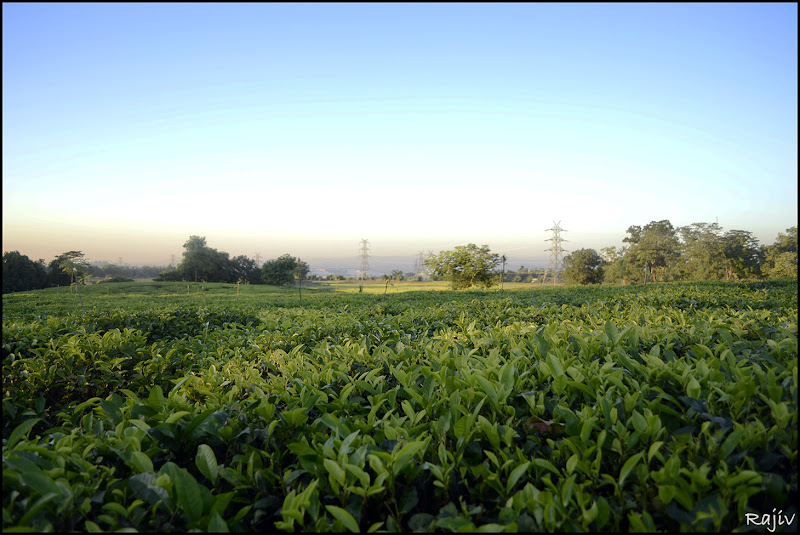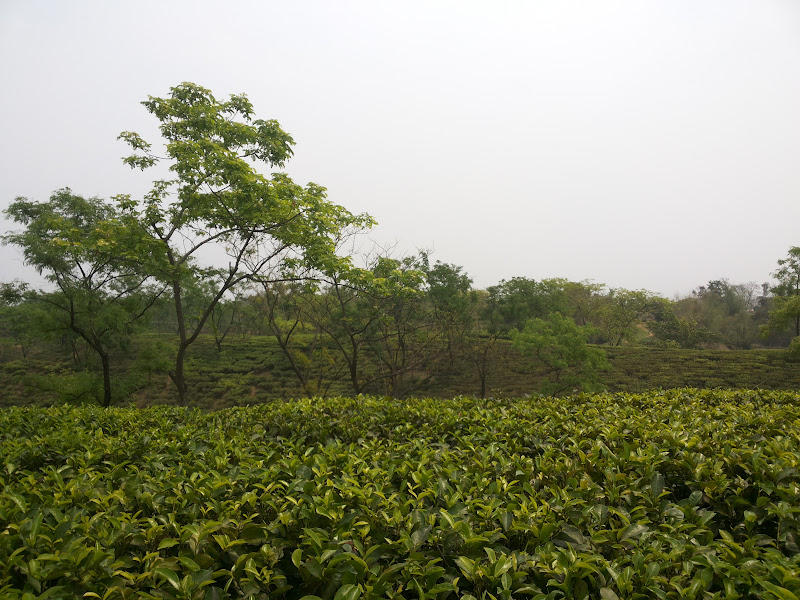The things that come in the mind when we talk about Assam are the vast tea-plantations, spread through acres and acres of inclines on the numerous teelas that are so common in this part of the country. The green carpet that flows smoothly from one teela to another with snaking narrow roads passing though them. Primarily grown in the region which known as Upper Assam, the tea has been the identity of the state since a long long time. More so because all the big brands of the tea-industry grow, process and sell (and export) their variants of assam tea from this region. The Southern part of Assam hardly has any big brand to boast of. That however does not mean that there are no tea-gardens there.

Tea bushes thrive under hot and humid climate and the southern part of Assam, just like upper – Assam, provides just that. But things are not so rosy in this part of the state. There is really no particular reason that I can think of because of which this region has hardly seen any corporate presence while the upper areas of the state boasts of a lot of the same. May be it is because of the connectivity and communication with the rest of the country. However, it had not been this way always.

During the pre-independence days, the Barak Valley was well-connected with mainland India via what is now Bangladesh. It took much less time to reach Kolkata than it takes today. With another country now geographically sitting between two regions of India the only connection to the mainland was now through the long the hills of Meghalaya and Assam.

Crossing hills, be it by road or rail, meant time-taking journeys and in turn, late arrivals at the destinations. Over time, the focus shifted towards expanding the plantations to the areas which were well-connected with the rest of the country. The tea-gardens in and around the towns of Silchar, Karimganj, Hailakandi etc. kept getting less and less attention and with time many factories and tea-estates downed their shutters.

People who had worked for the tea-companies their entire lives are now finding it hard to take-up jobs they have never done but they are left with no other option.

There are a handful of tea-gardens in and around my home-town Silchar and at-least for now, they are functional and the charm of a tea-garden still remains.

For someone like me who has his roots deep in the tea-gardens of Assam and its way of life I feel deeply pained by the way things are. What adds to this pain even more is the sad that, if there’s no helping hand from those who are in a position to turn things around if they want to, it will only be a matter of time before the tea-gardens of south Assam will become a thing of the past.
I hope that things start changing for good before it is too late.
That’s sad to read Rajiv. Politicians are busy filling their homes. No one bothers about taking the country forward.
Thing about India is nothing changes. Every year when I visit India, I find nothing has changed. Only population density increases, which in turn is piling up more pressure on present infra.
That is the sad state of affairs. And the labors of the tea-industry live in the most abysmal conditions you can imagine, that too when the industry is so big and thriving. There was a documentary on Al Jazeera about the life in Tea-Gardens of Assam. Have a look at it if you can.
I saw that Al Jazeera documentary before. I was appalled to see the working and home conditions of the tea workers. There are so many ‘layers’ of change that India has to go through before it can really compete with developed nations, ranging from population, education, culture, economic, infrastructure, bureaucracy, transparency, politics to technology, etc, and the list goes on and on.
Sad but true Kat. But to be honest, I don’t see much progress happening in the aspects mentioned by you, barring a few may be.
You would be surprised if I tell you that a lot of the ‘tea-ESTATES’ used to pay as low as Rs.23/day (~1.41 MYR) as labor charges. until a few days back!
The world the tea-garden laborers and the world outside, there’s a huge huge contrast between the two. I have seen it up close 🙁 .
Sad state of affairs. The condition is more or less same in Darjeeling; the workers of the tea-gardens are rotting…low wages, inhuman living condition, and inadequate infrastructure being the main reasons. Ironically, no Government, either the state or the central pays heed to the problem persisting from the days when tea gardens in Assam & Darjeeling came into existence!
And all this even after ‘tea’ being more than identity of the region. I don’t see any change happening in the days to come 🙁 .
Worse, I recently came to know of another tea-factory, one belonging to the tea-garden that was right next to where I spent the first 22 years of my life was shut.
Sad to hear that Rajiv and through comments so much more was revealed. Yes, India has a long way to go and many like me are oblivious to this. Thanks for sharing!
That’s the sad truth Parul. I suggest you look up the documentary that Al Jazeera did on the subject and watch it.
For something almost synonymous to the north-east India, the situation is really really sad and I for one, don’t see anything positive coming-up in the near future 🙁 .
Hi Rajiv: My name is Ian Deuchars. My home is in Salem, Oregon. I am 75-years old. I was born in Shillong. My father’s name is Reginald Robert Deuchars and he was the manager of the Larsingah Tea Estate in the late 1930’s and early 1940’s. I have a wonderful picture of the bungalow at the Larsingah Tea Estate. I wonder if the Larsingah TE is still in operation? We left Larsingah TE and my father became manager of the Kootalgoorie TE. I find myself saddened when reading the current state of affairs with the tea gardens of India. Just to finish my own boring history, when my father retired from India in 1953 we went back to Scotland where I attained my BSME. In 1963 I emigrated to America. As a VP of engineering I travelled extensively; much of it in SE Asia, building Pulp, Paper and Fiberboard plants. Regrettably I never travelled to India.
Best regards. … Ian.
Hi Ian. I am delighted to read from you about your childhood. Thank you for writing.
Sadly, both the tea gardens you had talked about have been locked down because of mismanagement of the tea gardens. I too have my roots in the tea gardens of Assam so I can feel you. But the truth is sad 🙁 .
I would like to request you to share the photo of the bungalow you have with you, if that’s not a problem with you. I will be so glad so see the same.
Also, I would be very fortunate if you would agree to share some of the stories of your childhood in these areas. I would be more than happy to share the same on my blog for my readers, if you agree.
On a different note, have you ever thought of visiting the places where you had spent your childhood, in these tea gardens and l connect with your roots? If you wish to, I will be more than happy to help you in that.
Once again, thanks for taking time to write on my blog here. I look forward to hearing more stories of your time here in the tea-gardens.
Thanks,
Rajiv